By the loom – Bailou creates livelihoods for grassroots weavers
Earthy, handcrafted yet contemporary sarees are a rare treat, being hard to find even in big cities. But if you are in Kolkata and want to experience all these under one roof, drop in to Byloom. A store that retails Bailou weaves, an eclectic mix of handwoven silks and cottons in vibrant hues and textures. Bailou started with the idea of making handloom trendy and contemporary way back in 2002, when founder couple Bappaditya and his wife Rumi Biswas realised that Bengal textile was declining.
“Bengal textile was really going through a slump. We could see that all the techniques were available but there was not much experiments done apart from the traditional sarees that they were weaving and the market for traditional sarees at that point was shrinking”, recalls Bappaditya.
While Bappaditya graduated from the National Institute of Fashion Technology, his wife Rumi is a graduate from the National Institute of Fashion Design. Both of them worked at a textile firm prior to taking a plunge into their entrepreneurial venture. Their love and inclination to push the boundaries of handloom and try to create new textures was the prime focus.
“Bailou really gave us that opportunity to mix various fibres with yarns and create new textures, Bailou’s signature is creating new patterns, designs and textures,” adds Bappaditya.
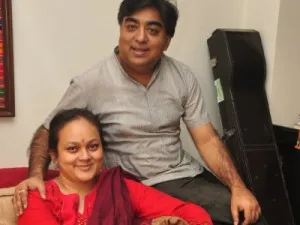
EMPOWERING GRASSOOTS WEAVERS
In India, grassroots weavers barely make ends meet as they are usually under a Mahajan but Bailou is trying to change that. Bailou works with grassroots weavers and instead of paying them mere wages as labourers, they incorporate them as individual entrepreneurs.
He says, “What we did was we started working with grassroots weavers, we train them to dye yarns, we train them for quality control, and we make them to be individual entrepreneurs, so right now our structure is, we work with 1200 handlooms, different weavers at the grassroots, individual weavers have become entrepreneurs.”
What they are also doing is trying to provide employment to women who have never had a means of livelihood. These are talented grandmothers who make katha weaves for their home.
“We work with old women , who are used to making katha for the family, so we started giving them new sarees and asked them to do that quilting for us.These are folk who never earned any money otherwise.”
They have also trained women in the villages to make a lot of sequence yarn, so that is also an additional income to the women. These are some of the initiatives that Bailou has taken up which in turn are helping empower women.
BAILOU SIGNATURE WEAVES
Apart from the sarees, Bailou also offers scarves, dupattas, running yardages, katha and bed linen. The designers experiment a lot with the textures and designs and it is clearly reflected in all their weaves.
”We have introduced for the first time in the country a way to weave sequence inside the fabric, so that is something that is totally our contribution, we also started doing transparent pallus with matka bodies which is again a Bailou signature, the jamdani patterns became much bolder and bigger, the pallus became transparent and bodies became solid opaque with matka yarn, so that is again you could say a Bailou signature,” says Bappaditya.
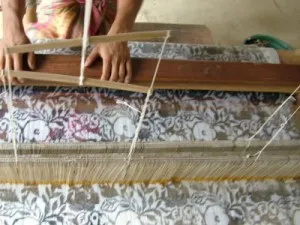
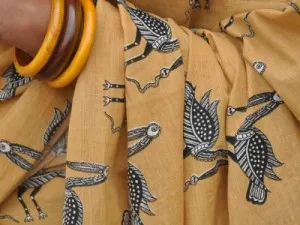
He adds, “People copy it and sell it as Bailou sarees, so Bailou has become more like a genre rather than a brand. And also Bailou works with around 1200 handlooms and there are over a lakh handlooms in West Bengal.”
So, Bappaditya says that if a weaver is copying the Bailou design and making a living that’s another way of giving back to the society and they don’t treat that as competition.
Currently they are working a lot with linens and claim to be the first ones in the market to introduce ghicha yarn into the sarees which later in the market they started calling jute. They also blend in a lot of different cottons, silks and linen into the fabric and mix it and trying to create new textures and new weaving patterns .
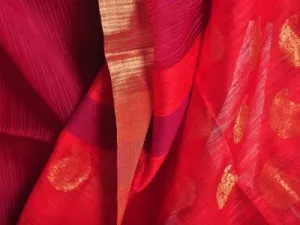
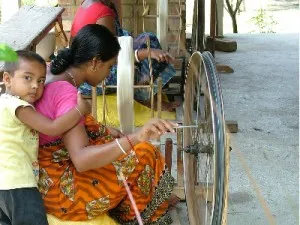
RETAILED THROUGH…
At the moment Bailou has two stores in Kolkata by the name Byloom, one in Hindustan Park and the other in Salt lake. Apart from that Bailou products are sold through 40 wholesalers across the country. They also take part in various exhibitions with crafts counsels of various states. Bailou currently exports to USA, Australia, France. They wish to work with people who understand handloom, as it is a specialised craft. Bailou weaves are now also available online at www.byloom.co.in
Going forward, the founders want to make handloom more versatile, make the products out of handlooms more contemporary and more accessible.
As Bailou over the years has tried to provide sustainable livelihoods to grassroots weavers, what they expect from the government is not subsidies for these weavers but improvement in basic infrastructure in these villages.
Bappaditya says,”A lot of young girls embrace Bailou sarees, they love and understand handlooms, so the craft is certainly not on a decline, what we need is make the designs and textures more contemporary.”Bailou started working with 2 handlooms in 2002 and now they work with 1200 handlooms across West Bengal and also slowly spreading its wings to Odisha and Andhra Pradesh. They want to replicate the same model of working with grassroots weavers in some of the other states.







